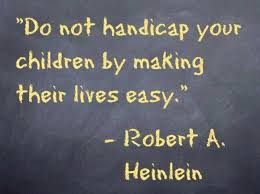Helicopter parenting has been the focus of quite a few articles in the media. Parents over-praising their kids because they feel it promotes self-esteem, even though in the long run it creates adults who are afraid to fail and so play it safe. Parents intervening to get low grades changed. Parents showing up for their kids’ job interviews. Helicopter parenting has even been blamed for the entitlement mentality of Millennials.
But what is “helicopter parenting” anyway? If the consequences are so damaging, why do parents take this approach?
Helicopter parents are driven by a desire to be a “good parent,” but they take it to an unhealthy extreme. They “hover” over their children to ensure that only good things happen to them. It’s essential to be engaged in the life of a child, but helicopter parents are over-engaged. They manage the details of their lives, solving their problems, making their decisions for them, and even doing their work for them—things kids are capable of doing—and need to do for themselves to learn skills and personal strengths they’ll need later in life. And while small children need to be protected from danger, helicopter parents go too far. They try to protect their children from want, disappointment, humiliation, frustration or any negative emotion. It’s good to provide for the needs of children, but surely nothing good comes from giving kids everything they ask for.
Kids who have parents who wait on them hand and foot and give them everything often feel smothered by their parents’ constant presence; they long for more privacy and independence. And since they rarely have a chance to overcome adversity, they feel anxious and unsure of themselves in challenging situations. Having been praised so often when they didn’t deserve it, children of helicopter parents are unsure of their competence. And kids who are given whatever they want don’t feel gratitude; they feel entitled and cynical about their parents’ generosity.
The result is a young adult who may have a college degree but isn’t familiar with how the real world works and so lacks the independence, work ethic, social skills, self-esteem, and self-confidence to succeed in the workplace. Many of them fail to get their careers underway and return home to live with their parents.
Permissive, intrusive parenting isn’t a recent phenomenon. For example, many children raised in wealthy families are overly-indulged. Further, not all adults in the millennial generation lack a strong work ethic. Many of them were raised in needy families where helicopter parenting was impossible, and the children had to pull together to keep the family afloat. Familiar with adversity, hard work, and problem-solving, these adults bring valuable skills and character traits to the workplace.
Given the disastrous consequences, why do so many parents feel the need to over-parent? In my study of this problem, I’ve found that some parents:
- Want their child to get into a good school and get a good job, so intervene, manage and do tasks the child could and should do for himself.
- Are short-sighted and don’t think about the long-term consequences of their approach to parenting.
- Lose sight of the primary goal of parenting, which is to raise a child who has the life skills and character strength to become an independent, capable adult. So the parents fail to allow the child to experience challenges that can teach them the skills and habits that come from solving their own problems and doing their own work.
- Try to be the kind of “good” parents who are engaged in the life of their child, but are afraid they’re not doing enough, and so they over-do it.
- Are so concerned about the difficulties and dangers of the world that they prefer to protect and control a child rather than to allow freedom.
- Out of good-heartedness can’t stand to see their child struggle, so they feel it’s their obligation to resolve, advise, and make things happen for the child.
- Feel that being a parent fulfills their need to be needed, often to the point that they’re horrified by the idea that their child will leave home someday, so subconsciously they foster dependence.
- Remembering want, hurt or neglect they suffered during their own childhood, they feel determined to achieve the opposite with their own kids.
- Are so sensitive to peer pressure that they want to impress other parents with their ability to do things for their kids.
You don’t have to be a full-on, card-carrying helicopter parent to make some of the mistakes that over-protective parents make. Do any of the above mindsets strike a chord with you? Are you over-praising your child? Do you over-provide?
Or do you expect your kids to contribute to the family enterprise? And allow them to make mistakes in order to learn from them?
As the late Robert Heinlein advised: “Do not handicap your children by making their lives easy.” The stakes are huge, and the consequences can’t be undone.
 And helping your child develop vital thinking skills is perhaps the best way to prepare them for leaving the nest. My new book: How Your Teen Can Grow a Smarter Brain.
And helping your child develop vital thinking skills is perhaps the best way to prepare them for leaving the nest. My new book: How Your Teen Can Grow a Smarter Brain.
You can grow the bond with your child through better listening. Download the FREE ebook, Listening to Understand.

